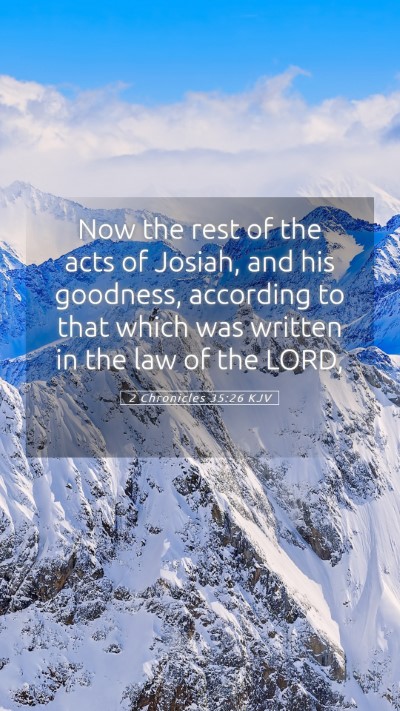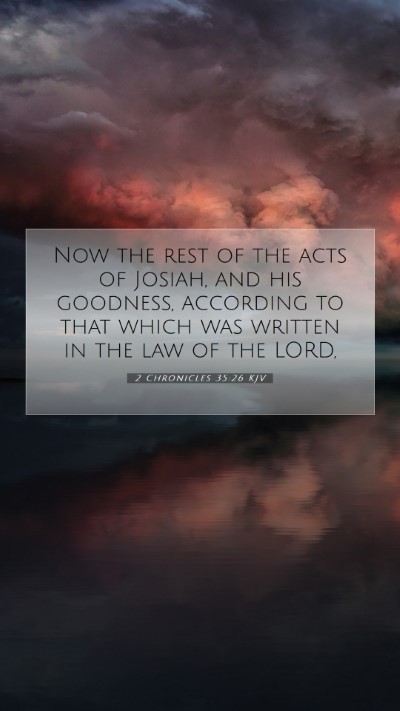Bible Verse: 2 Chronicles 35:26
Overview: This scripture is situated in the context of King Josiah's reign and details the significant religious reformation and the impact it had on the nation of Judah. The verse emphasizes the remembrance of Josiah's deeds and the importance of the Passover that he restored.
Bible Verse Meaning
The meaning of 2 Chronicles 35:26 can be explored through various commentaries, providing a rich tapestry of insights into its theological and historical significance.
Insights from Public Domain Commentaries
- Matthew Henry:
Henry expresses that this verse highlights not only the reforms of Josiah with respect to the observance of the Passover but also serves as a reminder of his righteousness in contrast to the kings that preceded him. He emphasizes the importance of commemorating Josiah's faithfulness and the revival of true worship in Israel.
- Albert Barnes:
Barnes discusses the significance of the Passover observance restored by Josiah. He notes that the regular celebration of this feast is crucial in maintaining the identity of Israel as God’s chosen people. The remembrance of Josiah's reforms also serves as an encouragement to future generations in upholding God's commandments.
- Adam Clarke:
Clarke provides an analytical look at the contextual framework of the verse, noting the historical background of Israel's kings. His commentary stresses the moral and spiritual implications of Josiah's revival efforts, suggesting that his legacy should inspire ongoing faithfulness to God’s laws long after his reign.
Bible Verse Interpretations
To understand this verse, it’s essential to consider how it reflects God’s covenant with His people. The observance of Passover serves as a pivotal reminder of God’s deliverance from Egypt and an ongoing symbol of faithfulness.
Key Themes
- Faithfulness to God: This emphasizes the importance of loyalty and devotion to God's commandments, as demonstrated through King Josiah’s reforms.
- Community Identity: Through the observance of Passover, the community reinforces its identity and connection to their heritage.
- Legacy of Righteous Leaders: Josiah’s example illustrates the impact that a righteous leader can have on national faithfulness and worship practices.
Understanding Scripture
The deeper understanding of this scripture involves looking at the historical context and recognizing the significance of religious festivals in Israel’s tradition. This also relates to how these observances shaped their collective worship and lifestyle following their exodus from Egypt.
Historical Context
Josiah’s actions are set against the backdrop of a nation plagued by idolatry and corruption. The revival of Passover observance marks a pivotal shift towards a renewed commitment to God’s law.
Biblical Exegesis
In approaching this verse through biblical exegesis, scholars examine the language, context, and implications of the text, analyzing how these elements contribute to the overall message of redemption and obedience.
Applying Bible Verses to Daily Life
This verse invites readers to reflect on their own commitments to faith and the importance of maintaining spiritual traditions that connect them to their heritage and community.
Cross References
- Exodus 12: The original establishment of the Passover.
- 2 Kings 23:21-23: A parallel account of Josiah's reforms and Passover observance.
- Deuteronomy 16:1-2: Instructions on observing the Passover feast.
Conclusion
2 Chronicles 35:26 serves as a powerful reminder of the importance of faithfully observing God's commandments and the role that righteous leaders play in guiding their communities in worship. Through a combination of historical understanding and spiritual reflection, we can gain valuable insights from this verse that resonate across ages.


